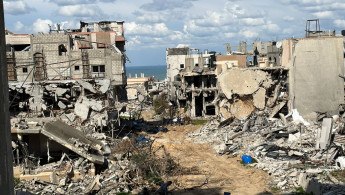Israel systematically destroying buildings in Gaza to create buffer zone
Israeli forces in Gaza have systematically destroyed buildings in an attempt to create a buffer zone inside the Palestinian territory, experts and rights groups told French news agency AFP, raising fears over the civilian cost.
The plan, not publicly confirmed by Israel, appears to entail taking a significant chunk of territory out of the already Gaza Strip, something experts as well as Israel's foreign allies have warned against.
Since Hamas stormed across the border on October 7, Israeli forces have targeted structures in Gaza within a kilometre (0.6 miles) of the border, said Adi Ben Nun, a professor at the Hebrew University of Jerusalem who has carried out an analysis of satellite imagery.
More than 30 percent of all buildings in that area have been damaged or destroyed during the war, he said.
Last month, the Israeli army's deadliest day since the ground invasion began in late October offered a glimpse of the tactics being used to clear the border area.
Israeli army chief Herzi Halevi said at the time that 21 reservists were killed "during a defensive operation in the area separating the Israeli communities from Gaza" to allow for residents' "safe return".
The troops had laid out explosives to blow up buildings when they were fired upon by Palestinian fighters, the army said.
Displacement of Gazans including from the border area could breach the laws of war, experts said.
"Satellite photos show new demolition along a 1-km-deep path on the Gaza Strip’s border with Israel....The destruction comes as Israel has said it wants to establish a buffer zone there..., further tearing away at land the Palestinians want for a state."https://t.co/ALu1MYaL9G
— Kenneth Roth (@KenRoth) February 2, 2024
"We are seeing mounting evidence that Israel appears to be rendering large parts of Gaza unlivable," Nadia Hardman told AFP, a refugee rights expert at Human Rights Watch.
"One very clear example of that may be the buffer zone -- this may amount to a war crime."
The Israeli military did not comment on the buffer zone.
Cecilie Hellestveit, of the Norwegian Academy of International Law, also told the news agency of "the prospect of ethnic cleansing, transfer, or lack of rebuilding, so that the Palestinians will eventually be forced out of the area entirely".
Scrutiny of Israel's actions in Gaza is likely to be heightened by last month's International Court of Justice ruling asking Israel to prevent any acts of genocide.
The United States, Israel's top ally and provider of military aid, has repeatedly said Gaza's territory should not change and that a buffer zone would breach that principle.
"When it comes to the permanent status of Gaza... we remain clear about not encroaching on its territory," said US Secretary of State Antony Blinken.
Rights experts said Israel could use parts of its own territory to create a security zone.
"If the Israeli government wants a buffer zone, it has every right to create one in far larger Israel, but it has no right to seize land in Gaza," human rights expert Ken Roth, a professor at Princeton University, said on social media.
Hamas's attack on Israel resulted in the deaths of around 1,160 people, according to official figures, with the group also seizing hostages - dozens of whom Israel says remain in Gaza.
In response, Israel launched a withering offensive that has killed at least 27,238 people in Gaza, mostly women and children, according to the health ministry in the besieged territory.





 Follow the Middle East's top stories in English at The New Arab on Google News
Follow the Middle East's top stories in English at The New Arab on Google News

![MP Essam Diab's pursuit to block TikTok in Egypt has revived an already ongoing debate in the country. [Getty]](/sites/default/files/styles/image_330x185/public/1230748046.jpeg?h=a5f2f23a&itok=-8MqBLLC)
